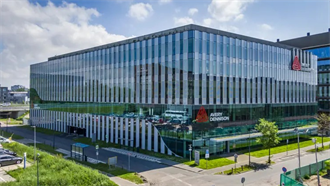‘Challenging’ was a word frequently used to describe this year’s business environment during PropertyEU’s recent State of Logistics roundtable in Amsterdam.
Experts from leading European logistics developers and investors gathered in the Dutch capital in September to discuss a range of pressing topics affecting the sector, from inflation and the energy crisis to war in Ukraine.
Giving their views were Christopher Mertlitz, head of European investments for WP Carey; Sander Breugelmans, regional head, northern Europe at Prologis; Laurie Lagarde, head of EMEA logistics operator division at CBRE Investment Management; and Nick Cripps, director of capital markets Europe for Panattoni.
The panel heard how day-to-day business has got more complicated this year, due to disruption caused by Russia’s invasion of Ukraine, energy uncertainty and soaring costs of raw materials such as steel and concrete. Some of these factors have been counterbalanced by the fundamental strengths of the logistics asset class, the panel agreed.
WP Carey’s Mertlitz said: ‘This is really a challenging environment, [in] that you underwrite a deal on day one and agree on a price, then by the next day your rates have moved a lot, which makes it challenging and just quite unpredictable. Then again, challenges often also bring good opportunities as well.’
Breugelmans of Prologis said: ‘I think the value proposition for logistics, especially on a relative basis to other sectors, is still really good. There will be good opportunities coming up. But the question is, what are those opportunities? Everybody right now is looking for data points. There are sellers out there who aren’t quite certain yet whether or not to let go of their assets. The buyer pool is much larger than it used to be. It's also really hard to know by how much yields have expanded, but they certainly have.’
CBRE IM’s Lagarde noted vacancy is low across Europe, a positive sign for the segment, going forward.
‘There's also one important element we need to think about, which is the amount of capital that wants to invest in logistics,’ she said. ‘And when you look at the sector allocation in Europe of logistics compared to the US, there is still growth to come. So, it's really positive. I think we are living in a kind of grey area, where it's difficult to say where the yields are today and even more difficult to forecast where they're going. But I think the sector is showing really strong fundamentals. So, I'm pretty positive about that.’
Buyer pool changing
Market disruption has upsides for some players, pointed out Cripps of Panattoni.
‘For so long, there's been a lot of frustration in the all-equity or low leverage buyer pool where a lot of institutional investors – who were traditionally the backbone to the market – have been priced out of the market by the highly leveraged debt backed buyers. It's likely too early to say, but we're starting to see some signs in the UK, where some deals are starting to transact to equity purchasers at discounted levels, versus where they were three or six months ago.
‘The yield decompression is reaching levels where it is actually enticing for all-equity players to take advantage of this market dislocation, who for some time had been struggling to compete.’
One cause of extra workloads this year has been surging prices for building materials, upon which logistic developers depend to build assets. High inflation has gone from a spectre to a reality and it can even affect how long a development takes to complete. It’s been a ‘daily battle’ the panel heard, although some prices show signs of stabilising as Q4 approaches.
Breugelmans said navigating the current environment also involved managing customers’ expectations. ‘They need space and they need it quickly. I do see customers, though, that are starting to take into account that they definitely need a more strategic approach to their space,’ he said. ‘They basically want to make sure they don't miss out and will have the space for future growth. It remains a challenge for sure.’
Ukraine conflict and nearshoring
A major contributing factor to the market turbulence this year has been the first armed conflict in decades in Europe. For some on the panel it is a personal issue, as well as a commercial one.
Cripps said: ‘We're huge in Poland; we have a large presence right on the border of the conflict. For us out here in western Europe, it's “over there”. And for a lot of investors, especially the dominant investor pool – which has been coming from North America – it really does feel a long way away.
‘[But my] colleagues in Poland have been hosting refugees in their houses, they've been driving after work to the stations to drop off supplies for shipping over there. From a company or corporate level, we've also tried to do a bit with what we've been offering to NGOs, space for storing supplies for Ukraine and obviously trying to help out any displaced businesses from Ukraine by accommodating them in what vacancy we have.’
One consequence of the conflict has been fresh demand for space in neighbouring countries, which may become a long-term trend.
‘I think these [issues] are like puzzle pieces that are pointing in the general direction that we're going to see much more manufacturing and production – and consequently, logistics and distribution and warehousing – coming back to Europe,’ said Mertlitz. ‘I think this is a bigger trend we'll be seeing in the next few years and I think for the industry, it's positive.’
Indicative of this trend, noted the panel, is that this year has seen the first occurrence of strong rental growth in Poland, where rents are expected to rise by about 20% over the course of 2022 – a significant jump in a market where rents have long been flat.
Hard choices
The disruption seen this year is not dissimilar in scale to that wreaked by the pandemic, the panel heard, and the real estate sector should have a role in the actions being taken across Europe to tackle myriad challenges.
Lagarde said: ‘There is an impact today upon our businesses. I wonder whether some governments will provide some solutions and incentives for businesses. In France, they are currently talking about capping the inflation, which is not good news for us, but [...] which is something that will have a pretty positive impact on our tenants.
‘Long term, we all have a collective responsibility of addressing this, not only governments. We are developers and owners, all with a certain amount of square meterage of logistics. We have to think about the next generation of buildings that will save energy. This is not only about energy prices going up today, but it's also the bigger element of ESG.’
Events this year have put the ESG (environmental, social and governance) agenda in the spotlight, with some voices in politics asking whether signature campaigns such as ‘Net Zero Carbon’ are feasible during an energy crisis when inflation is high. PropertyEU’s roundtable participants said now was the time for the sector to show leadership by committing to sustainability.
WP Carey installed one of Europe’s largest arrays of rooftop solar panels in 2020. Mertlitz said pursuing the ESG agenda was a ‘no brainer.’
‘It's never been easier to justify green initiatives and investing in your buildings to make them more environmentally friendly,’ he said. ‘Obviously, from a social perspective, from a responsibility perspective, but also, frankly, speaking from an economic perspective, because with energy prices as high as they are, it's just a complete no brainer. In many instances, you can just look at the payback periods for said investments.
‘Our asset management team is doing a fantastic job with the properties we already own, in terms of reaching out to tenants and being super proactive. [ESG commitment] needs to be huge because collectively as the real estate industry, we are responsible for a lot of the world's environmental greenhouse emissions. So, it's absolutely the right time to focus on [ESG] even more.’
ESG reality
Breugelmans said ESG was already embedded in the logistics sector. ‘As an industry, we have to go to a “net zero” environment, I think our buildings should be energy positive. [...] We absolutely have to lead here. If we don't, I think developers and investors that do not lead, will become obsolete. I think it's a defensive play, if we don't do it, we don't preserve our yields, our buildings will not be attractive for our customers anymore and we will lose out. So, we have to do this. It's the right thing to do and it's a smart thing to do.’
Cripps said occupiers are driving demand for greener buildings and they will influence how the ESG agenda develops. ‘Sixty percent of what we do is speculative development. So, you've got to get the economics right, to balance out the commercial viability in going uber-green.
‘The commercial reality is we are trending that way and we have to be mindful of what our occupiers are asking for. But equally, is the capital there to over-spec from a green agenda point of view, when the occupier won't necessarily pay the rent or increase their bottom line? It feels like [...] we’re at that inflection point where occupiers will consider paying more to justify the elevated build cost to supply it.’
New markets and asset types
Amid the disruption of 2022, logistics players are continuing to seek new frontiers and fresh opportunities within established markets, buoyed by the segment’s fundamental strengths, including the rise of online shopping.
‘Poland has good opportunities and we really like Germany,’ said Lagarde. ‘Not only does it have a strong economy, but vacancies are really low and rents are increasing. We like the Netherlands, where we've invested a lot. We’re also looking very closely at southern Europe, because one of the elements is that e-commerce penetration rates are very low. So, we are anticipating these to accelerate in the coming years.’
‘New frontiers’ also includes types of assets which are different from traditional warehouses. Breugelmans said: ‘It’s evolved. We used to be solely in a big box business, but we've seen the demand for last mile, focused on the true big cities in Europe. […] When you have sites that are close to population centres, new uses appear, such as data centres. We are actually starting to convert some places into data centres, or other uses when there is value to be added. I'm always excited about those.’
Mertlitz pointed out that understanding what occupiers need is key: ‘We really look for properties we deem to be mission-critical for the tenants. But at the same time, that doesn't mean that's all that we buy. A big portion could be specialised assets, as well. One characteristic logistics has is it is comparatively straightforward to understand why a building is so important to the tenant. [...] We want to acquire properties that are mission-critical for tenants, which makes us gravitate towards this asset class.’
What’s next?
The roundtable event wrapped up by inviting the panel to predict what may lie ahead for logistics, while acknowledging crystal ball-gazing was very far from an exact science, especially in 2022. After years of strong growth and of logistics being real estate’s hottest asset class, some professionals noted that tackling the difficult environment had been an invigorating contrast to the segment’s prior “everything is awesome” outlook.
Lagarde called upon logistics players to learn the lessons of taking on this year’s challenges. ‘We have to recognize what is going on in the macro market and we need to think about taking that into account. I'm pretty positive when I look at the fundamentals of the sector; the low vacancy that we're seeing has never been seen in the past, supply is really low, some capital is yet to be deployed and occupier demand is really strong. [But] we have to learn from the situation we're facing today.’
One subject of prediction was what central banks may do to ease the effects of inflation, which is expected to weigh upon Europe more heavily than other regions, such as the US.
Cripps said: ‘There's a multitude of things they might try. [...] I think there will be disagreement among EU member states about what is the right strategy; especially when it comes to the sanctions. Depending on how deep and hard this winter gets from an energy point of view, I think it could really hurt. We all know governments don't have endless pots of cash to support us every winter. We've just got to try and navigate what's in front of us.’
Breugelmans said logistics players will thrive if they make smart decisions. ‘If you acquire good assets near major population areas where there's still upside in the short term in terms of rents, I think you'll still do well, even in this environment.’
Mertlitz said: ‘I'm a natural optimist, but I think this [upcoming period] will be quite tricky. And we will see some changes in cap rates and yields which need to shift to adequately reflect the changing paradigms we're in. But at the same time, stay diligent, stay focused on your core business and we'll all get through this in a good way.’


































